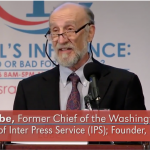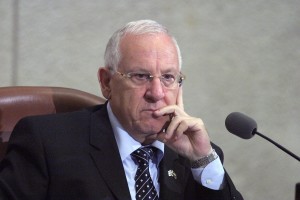by Jim Lobe
I have some lingering questions about the Cotton letter that Bill Kristol is now touting as a brilliant tactic in rallying support for the Corker bill (which, as presently drafted, would also sabotage the P5+1 negotiations).
First, did Tom Cotton (R-AR) really reach out to Democrats, as he insisted that he did, for their support of the letter? Both Politico and Reuters have looked into this. Neither found any Democratic senators, including those of the more hawkish variety like Menendez and Casey, who say they were contacted by Cotton or his office. Here’s Reuters:
Cotton’s staff said he reached out to “several” Democrats about the letter. But none said they had been contacted, including Senator Robert Menendez, one of the leading Democratic hawks on Iran.
Does this mean that Cotton was simply making this up in the belief that no one would try to find out whether he was telling the truth? And if he was lying about that very simple and easily provable (or disprovable) assertion, how are we to take his other assertions of fact about this episode?
For example, Cotton told The Washington Post that he first drafted his letter two weekends ago (which would have been the weekend of the AIPAC conference, just before Bibi Netanyahu’s speech to Congress on March 3). That’s certainly possible, given the rather clumsy and in some cases inaccurate ways the letter describes congressional prerogatives. But how did it come out so poorly, given the amount of time that elapsed between his first draft and its completion (presumably no earlier than Wednesday when he first presented it to the Senate Republican Caucus)? Granted that Cotton has a Harvard Law degree, but you’d think he would have passed the letter along to some real constitutional law experts just to review his work.
Indeed, Kristol himself, who told The Daily Beast he had discussed the idea with Cotton “as he was conceiving it and pondering whether and how to do it,” noted, “I know he consulted with others as well with some government and foreign policy experience, as you’d expect.
Who were these “others,” and why didn’t they catch the awkwardness and questionable assertions in the draft? And how is this consistent with the statements by at least two congressional aides who appeared acquainted with the letter’s provenance that it was actually designed as a “cheeky” reminder of the congressional branch’s prerogatives. I heard John Prideaux, The Economist’s Washington bureau chief, on Friday’s Diane Rehm show describe the letter as something that looked like it had “been dreamt up by some people in a bar.”
Which I suspect is exactly right – although, at this point, that is mere speculation on my part. But consider the following two scenarios:
In the first, Cotton spends the weekend of the AIPAC conference focused on how he can sabotage the P5+1 negotiations, even though he knows that (a) sabotage is precisely the purpose of Netanyahu’s speech to Congress in just a couple of days, and (b) that already-pending bipartisan legislation has a good shot at achieving a sufficient majority to withstand a presidential veto. So, after due consideration, he carefully drafts a letter addressed to the leaders of Iran, consults with a number of experts of various kinds to make sure the letter is legally sound and highly likely to achieve its desired purpose even before Bibi has spoken. The day after the speech, Cotton presents the letter to the Republican Caucus at their lunch meeting, insisting that this would be the best way to fulfil Bibi’s wishes.
In the second scenario, Cotton is indeed determined to do whatever he can to sabotage the negotiations, but he is waiting to see what happens with Netanyahu’s speech. Netanyahu, of course, is given a rapturous reception with many, many standing ovations, especially by Republicans and by some of Cotton’s most important backers in the House gallery (Kristol, Adelson, and so on) The result: everyone’s feeling really good, especially after throwing back a few at the reception following the speech. Cotton and his buddies (see photo here)—possibly joined by Israeli Amb. Ron Dermer, who, having just seen Bibi off, is exultant given his boss’s very public endorsement from the rostrum of the House chamber—retire to his Senate office or perhaps later to their favorite bar at the Mayflower to discuss what new prank they can pull off to make war more likely. And someone pipes up, “Let’s put out a letter that tells the Ayatollah that he can’t trust anything Obama agrees to and then get the Republican senators to sign on to it at tomorrow’s caucus meeting.” What a great idea! How cheeky indeed! (This could also have been done at or after the Adelson-sponsored fund-raiser for Lindsay Graham Tuesday evening.)
Which scenario do you find more compelling?
Either way, the Wednesday lunch meeting was reportedly quite brief as senators rushed to leave town in advance of the late-winter snowstorm that blanketed the capital, having signed on to what George W. Bush’s speechwriter called “a foreign policy maneuver …with all the gravity and deliberation of a blog posting.”
A final question: who translated Cotton’s letter into Persian? I assume he doesn’t have a Farsi-speaker on his staff, but there are several available at some of his favorite neoconservative think tanks and, I assume, at the Israeli Embassy. It would be very interesting to find out.
It’s worth remembering that Boehner’s invitation to Netanyahu was so controversial that he felt obliged to issue a background paper, on which he was later quizzed by reporters, regarding how it came about. Given the similarly unprecedented and equally (at least) consequential nature of the Cotton letter, shouldn’t we get a more comprehensive explanation about its provenance and development, especially because it appears that the junior senator from Arkansas has already lied about one key aspect of it?
Photo: Bill Kristol






I will be very interested on hearing answers to your useful questions.
My question is, how did this schmuck graduate from Harvard Law?
There should be a movement to hold it accountable. ;-)
mr.cottein doesn’t represent America the exceptional but America the uninformed. Heartbreakingly he has has set an example of why the U.S. Can be deemed an unreliable partner.
The world is not the US alone & we need other countries to trust and work with us.
As Irving Kristol did for Joe McCarthy, so does William Kristol for Tom Cotton. Will America recover this time?